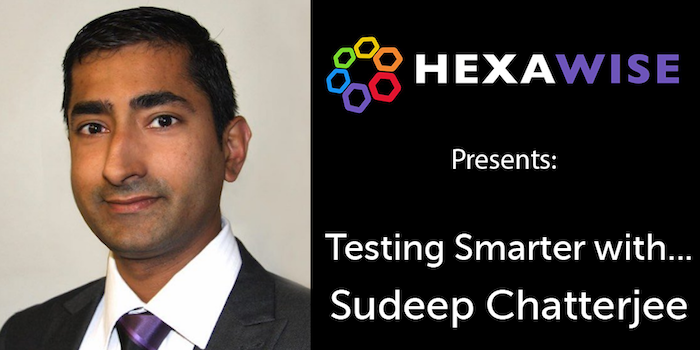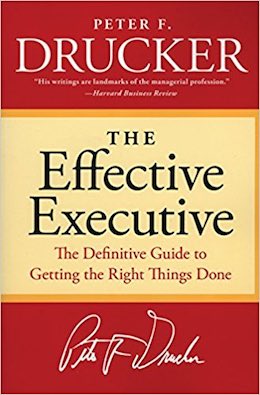Testing Smarter with Sudeep Chatterjee

This interview with Sudeep Chatterjee is part of our series of “Testing Smarter with…” interviews. Our goal with these interviews is to highlight insights and experiences as told by many of the software testing field’s leading thinkers.
Sudeep Chatterjee is a senior technology leader with 19 years’ experience with top tier Investment banks, FinTech and Consulting firms managing testing globally for enterprise-wide change programmes.
Currently Sudeep is working as Programme Test Manager/Head of Testing at Bank Of America Merrill Lynch within FICC - Global FX Technology group.

Sudeep Chatterjee
Personal Background
Hexawise: If you could write a letter and send it back in time to yourself when you were first getting into software testing, what advice would you include in it?
Sudeep: Coming from a technology background, I did not give enough emphasis on learning business when I started getting into software testing. The advice I would like to include in the letter back to myself is the importance of learning about business.
Hexawise: What drew you into a career in software testing?
Sudeep: I found software testing as a branch of software engineering where one needs to have the diverse interest of learning both technology and the business for which the software is built.
Software testers needs to learn the technical architecture and the underlying technology stack to work with the developers and find technical issues as well as work with business users to learn how the application will be used and find the functional issues.
Besides this in test management other skills are also required like project and programme management, stakeholder management and strong influencing skills. For software testers - learning never stops and never a dull day!
Views on Software Testing
Hexawise: What testing practice(s) do you most wish the software testing community would embrace?
Sudeep: As organisations embrace Agile and DevOps practices, it is important for software testing community to embrace the change and the opportunities and threats it brings along. There is a growing need for software testers who have been in the industry for many years, as well as individuals who are joining this profession, to have clarity on how they will bring value and make a difference to the business.
As developers get more savvy with the business knowledge by working closely with operational users as well as adopting test automation practices like Test Driven Development (TDD) and Acceptance Test Driven Development (ATDD), the old effectiveness and efficiency measures of defect leakage prevention to production by Quality Assurance (QA) is not relevant anymore.
Hexawise: Do you have specific suggestions for testers working within an organization using agile software development methods?
Sudeep: Software testers working within an organization using agile software development methods need to embrace the change of Agile and DevOps and first and foremost ensure that their role and goals in the agile team are well defined.
There are some agile teams where the Business Analyst or Product Owner writes the feature/story file which is then automated by developers using shared classes between unit and acceptance tests. These tests are run using automated tests at each build and software testers may have to review these tests and add additional tests as well as slowly learn the coding language (C++/Java/Python etc) and help developers write/maintain the automated testing framework.
There are other agile teams where the expectation is on test members to work with users and build the feature/story files using software testing techniques and ensure both positive and negative scenarios are covered as well as write the code to automate these tests.
There are other agile teams where tester write and execute tests manually in a sprint/release and different teams (separate test automation group) automate the tests in the following sprint/release. In this case the testers are manual but maybe having deep functional knowledge.
Depending on whatever the maturity level of Agile is in the team, it is very important to discuss and agree with other team members and management team what is the role of testers in the agile team vis-à-vis developers, business analysts and business users.
Industry Observations/Industry Trends
Hexawise: Have you noticed a change in the way the business side of organizations approach software testing in the last 10 years? What are the most significant changes? Have they made your life as a manager of software testing operations easier or harder?
Sudeep: The business side of organisations have really warmed up to software testing discipline of software development lifecycle in last 10 years and appreciates the value of structured test cycles before the product is released to production.
There are operations teams now who hire and train resources on the product and then allocate them to the project team as either Product Owner and/or User Acceptance Tester who have performance objectives to work alongside developers and QA members to ensure the product quality is high and limit issues in production. These resources may lack some knowledge about the technical aspects of software delivery but make it up with their deep functional knowledge which complements the development team really well.
in test management other skills are also required like project and programme management, stakeholder management and strong influencing skills. For software testers - learning never stops and never a dull day!
Hexawise: How would you like to see the practice of software testing evolve over the next 5 to 10 years?
Sudeep: The practice of software testing will really evolve in next 5 to 10 years with main difference being that emphasis will be given in grass roots computer science education about software testing. Not many computer science graduates currently aspire to be software testers and the primary reason being that software testing as engineering discipline is not explained to aspiring youths well.
Another big change that will evolve will be that senior management technology positions will have candidates who have been in software testing discipline rather than only having candidates from the development side. These leaders with a software testing backround will act as role models for the next generation of software testers.
As we get more CTO’s, CIO’s, Programme directors from software testing wing of the organisation rather than only development or architecture, will give more confidence for the new graduates that the software industry respect software testing as a profession and show there is sustained career growth model.
Staying Current / Learning
Hexawise: What advice do you have for people pursuing a software testing career? As a manager that must hire software testing expertise, what experience and skills are most valuable (what steps can software testers take to do advance their careers)?
Sudeep: People pursuing a software testing career need to be very clear why they have joined this field as unlike developers or architects, software testing is in constant threat of showing the value as there are always developers who are better technically than the tester and BA’s/Users who have more functional knowledge about the product.
As a Manager, when I need to hire software testing expertise, I go back to see what problem I need to get solved which cannot be fulfilled with current team set. If I need more automation done, then I would like to hire software testers or software developers who can build test automation frameworks and then integrate with DevOps tools for continuous testing.
If I need testers for functional testing then I look for software testers or business analysts with strong functional domain knowledge for e.g. for investment banking I would look for candidates with Chartered Financial Analyst (CFA) or Financial Risk Management (FRM) certifications.
As organisations embrace Agile and DevOps practices, it is important for software testing community to embrace the change and the opportunities and threats it brings along. There is a growing need for software testers who have been in the industry for many years, as well as individuals who are joining this profession, to have clarity on how they will bring value and make a difference to the business.
Hexawise: What books or blogs would you recommend for someone interested in management positions within software testing?
Sudeep: Management and leadership within software testing is no different to any other discipline of software engineering so reading the management books and models by thought leaders like Michael Porter, Peter Drucker, Stephen Covey, C K Prahlad, W. Edwards Deming etc. is very important.
Some of the management books I have personally found very useful are
- 7 Habits of highly effective people by Stephen Covey
- How to win friends and influence people by Dale Carnegie
- Art of War by Sun Tzu
- The first 90 days - Critical Success Stories by Michael Watkins
- The Effective Executive by Peter Drucker
Profile
Sudeep is a senior technology leader with 19 years’ experience with top tier Investment banks, FinTech and Consulting firms managing testing globally for enterprise-wide change programmes.
Currently Sudeep is working as Programme Test Manager/Head of Testing at Bank Of America Merrill Lynch within FICC - Global FX Technology group.
Prior to Bank Of America Merrill Lynch, was Head of Testing with Lombard Risk, Barclays, UBS, GE and Accenture, primarily focused on building high performing multi-disciplinary testing teams and delivering testing for complex technology-driven business transformation initiatives.
A quality evangelist Sudeep loves to solve organisational problems through improved thought leadership and quality assurance and testing strategies.
Sudeep is active member of software testing industry and has been part of industry events like:
- Speaker at QA Financial Forum London (2018)
- Judge - European Software Testing Awards (2016 and 2017)
- Judge - DevOps Industry Awards
- Keynote speaker on European Software Testing Summit - Best Use of Technology in Testing
- Conference speaker on National Software Testing Conference : How Is Software Quality Measured
- Contributor of European Software Testing Summit Report 2017 and 2016
Twitter - @QualiAssure
LinkedIn - Sudeep Chatterjee
Some previous Testing Smarter with... interviews: Testing Smarter with Alan Page - Testing Smarter with Angie Jones - Testing Smarter with Michael Bolton



